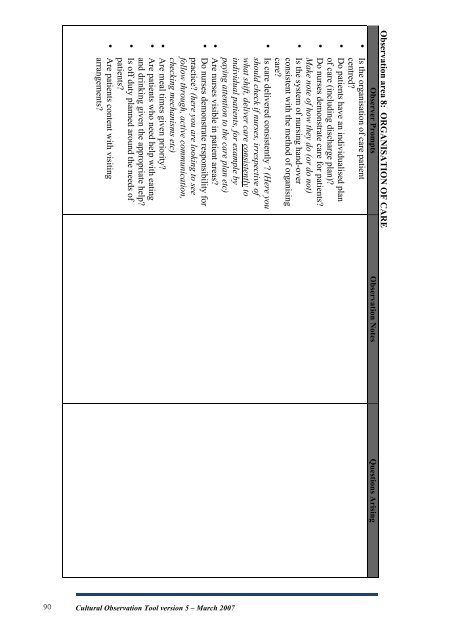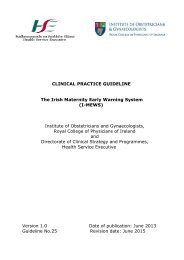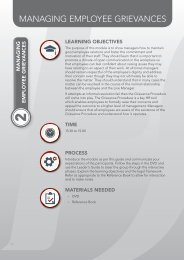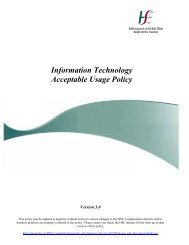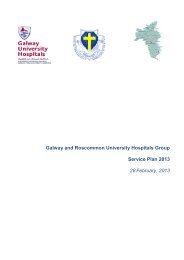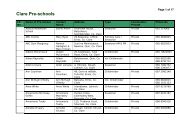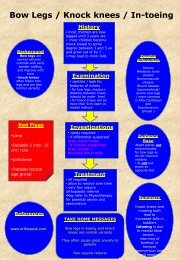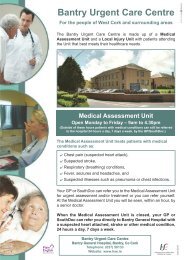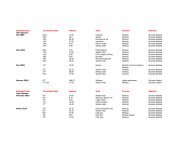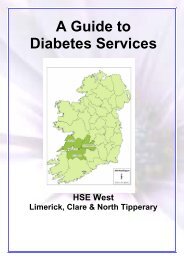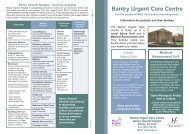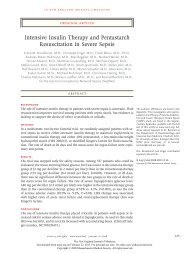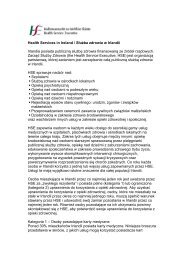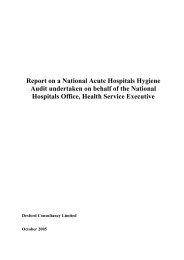Enhancing Care for Older People - Health Service Executive
Enhancing Care for Older People - Health Service Executive
Enhancing Care for Older People - Health Service Executive
Create successful ePaper yourself
Turn your PDF publications into a flip-book with our unique Google optimized e-Paper software.
Cultural Observation Tool – version 4 19<br />
90<br />
Workplace<br />
Culture<br />
Critical<br />
Analysis<br />
Tool<br />
ORIGINAL AUTHORS OF THE WCCAT<br />
o Brendan McCormack, Professor of Nursing Research University of Ulster and<br />
Director of Nursing Research and Practice development, Royal Hospitals Trust,<br />
Belfast.<br />
o Elizabeth Henderson, Lead Cancer Nurse, Northern Ireland Cancer Network.<br />
o Dr Val Wilson, Director of Nursing Research & Practice Development, the Children's<br />
Hospital at Westmead, NSW, Australia.<br />
o Jayne Wright, Research Associate, University of Ulster<br />
April 2007<br />
• Is care delivered consistently ? (Here you<br />
should check if nurses, irrespective of<br />
what shift, deliver care consistently to<br />
individual patients, <strong>for</strong> example by<br />
paying attention to the care plan etc)<br />
• Are nurses visible in patient areas?<br />
• Do nurses demonstrate responsibility <strong>for</strong><br />
practice? (here you are looking to see<br />
follow through, active communication,<br />
checking mechanisms etc)<br />
• Are meal times given priority?<br />
• Are patients who need help with eating<br />
and drinking given the appropriate help?<br />
• Is off duty planned around the needs of<br />
patients?<br />
• Are patients content with visiting<br />
arrangements?<br />
consistent with the method of organising<br />
care?<br />
Observation area 8: ORGANISATION OF CARE<br />
Observer Prompts Observation Notes Questions Arising<br />
• Is the organisation of care patient<br />
centred?<br />
• Do patients have an individualised plan<br />
of care (including discharge plan)?<br />
• Do nurses demonstrate care <strong>for</strong> patients?<br />
Make note of how they do (or do not)<br />
• Is the system of nursing hand-over<br />
The WCCAT has been developed to help people involved in the<br />
development of practice to undertake observational studies of work<br />
place settings in order to in<strong>for</strong>m changes in practice. The tool is<br />
suitable <strong>for</strong> use by anyone who has some experience of practice<br />
development including the observation of practice. The tool has<br />
been developed from an analysis of our experience of leading and<br />
facilitating practice development programmes over many years.<br />
Observation is one of the key tools used in emancipatory<br />
practice development – a <strong>for</strong>m of practice development that is<br />
concerned with changing the culture and context of practice in order<br />
to develop sustainable person-centred and evidence-based<br />
workplaces. Seeing practice, raising consciousness about taken <strong>for</strong><br />
granted practices and reflecting on taken <strong>for</strong> granted assumptions<br />
are key components of comprehensive observation. This tool is<br />
designed to help you develop a systematic approach to undertaking<br />
these activities.<br />
We encourage you to use this tool and would welcome<br />
your feedback on its relevance and usability in your practice<br />
development work.<br />
Contact<br />
Brendan McCormack: bg.mccormack@ulster.ac.uk<br />
Liz Henderson liz.henderson@bch.n-i.nhs.uk<br />
<strong>for</strong> further in<strong>for</strong>mation.<br />
Cultural Observation Tool version 5 – March 2007 1<br />
90


